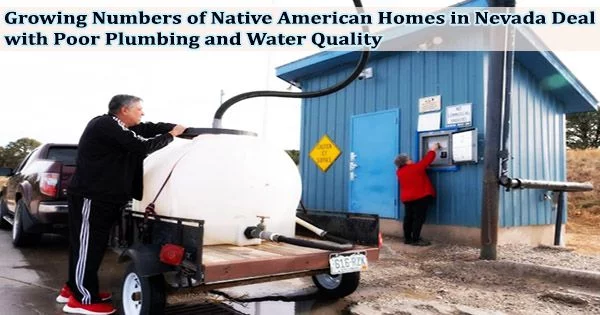According to a recent study by a team from DRI and the Guinn Center for Policy Priorities, an increasing proportion of Native American households in Nevada do not have access to indoor plumbing, a situation known as “plumbing poverty.”
The study examines patterns and issues surrounding water security (reliable access to an adequate supply of safe, clean water) in Native American households and communities in Nevada. It also discovered a worrying rise in the number of violations of the Safe Drinking Water Act over the previous 15 years.
Due to issues including population increase, climate change, drought, and water rights, Native American communities in the Western United States, especially Nevada, are particularly susceptible to problems with water security. In rural areas, aging or absent water infrastructure creates additional challenges.
In this study, the research team used U.S. Census microdata on household plumbing characteristics to learn about the access of Native American community members to “complete plumbing facilities,” including piped water (hot and cold), a flush toilet, and a bathtub or shower. They also studied drinking water sources and health issues using the Environmental Protection Agency’s water quality data.
In Nevada, Native American homes had a complete indoor plumbing deficiency rate of 0.67 percent on average between 1990 and 2019, which was greater than the national average of 0.4%.
According to their research, the number of persons without access to plumbing has steadily increased over the past few decades, impacting more than 20,000 people in 2019.
Water accessibility, reliability, and quality are major challenges for Native American communities in Nevada and throughout the Southwest.
Maureen McCarthy
“Previous studies have found that Native American households are more likely to lack complete indoor plumbing than other households in the U.S., and our results show a similar trend here in Nevada,” said lead author Erick Bandala, Ph.D., assistant research professor of environmental science at DRI.
“This can create quality of life problems, for example, during the COVID-19 pandemic, when lack of indoor plumbing could have prevented basic health measures like hand-washing.”
Plumbing poverty may correlate with other types of poverty. In accordance with past studies, analysis by the study team revealed that access to complete plumbing dramatically declined as the number of persons residing in a household rose.
The number of Safe Drinking Water Act violations in water facilities servicing Native American Communities in Nevada increased significantly between 2005 and 2020, according to study findings. The most common health-based violations included presence of volatile organic compounds (VOCs), presence of coliform bacteria, and presence of inorganic chemicals.
“Water accessibility, reliability, and quality are major challenges for Native American communities in Nevada and throughout the Southwest,” said coauthor Maureen McCarthy, Ph.D., research professor of environmental science and director of the Native Climate project at DRI.
The authors of the study anticipate that decision-makers and members of the general public who may not be aware that plumbing poverty and water quality are serious issues in Nevada would find their findings to be helpful.
The full study, “Assessing the effect of extreme heat on workforce health in the southwestern USA,” is available from the International Journal of Environmental Science and Technology.
This project was funded by the General Frederick West Lander Endowment at DRI. Study authors included Erick Bandala (DRI), Maureen McCarthy (DRI), and Nancy Brune (DRI, formerly of the Guinn Center for Policy Priorities).
















